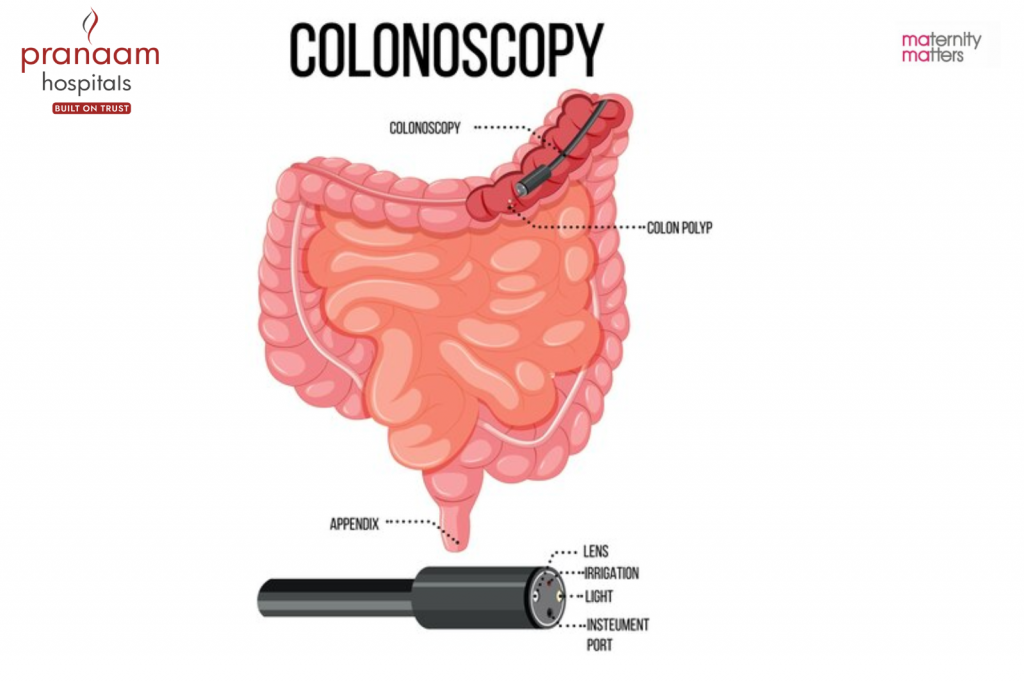Colonoscopy is a diagnostic procedure mostly used for screening and abnormality examination of the colon and rectum.
Endoscopy, like colonoscopy, is a procedure where a tube with a tiny camera is inserted into the stomach to evaluate the health and function of internal organs, such as the stomach, oesophagus, large and small intestines, and bile duct.
Who required a colonoscopy?
Colonoscopies are performed for a number of reasons, such as:
-
1. Severe and ongoing stomach ache that has lasted more than two weeks
2. Recurrent vomiting and belching
3. Extreme constipation problems
4. Blood in the faeces or urine Heartburn that occurs frequently
5. Overexposure to gas
6. A temperature of at least 100 F (37.8 C)
7. Bleeding or persistent diarrhoea lasting longer than two weeks
8. Pale skin without any obvious bleeding
9. Despite passing faeces, having trouble emptying the bowels
10.In addition, regardless of a family history of cancer, colonoscopies may be done on a regular basis to test for benign and malignant tumours.
Advantages of a Colonoscopy
A colonoscopy is an essential technique that is mostly used to identify and screen for problems related to the colon and the rectum.
Colorectal Cancer Screening: A colonoscopy is an essential method for identifying colorectal cancer early on. When gastrointestinal anomalies are detected, people can see a doctor right away and have a colonoscopy, which allows for rapid intervention and treatment of a variety of gastrointestinal conditions.
Polyp Detection and Removal: The capacity of colonoscopy to identify and eliminate polyps that may form on the intestinal lining is one of its main advantages.
Examination of Anaemia: When gastrointestinal bleeding is suspected, a colonoscopy is very helpful in determining the root cause of anaemia.
In order to locate and treat any sources of bleeding within the gastrointestinal tract, doctors could advise colonoscopy.
Weight Loss Assessment: A colonoscopy may be conducted to look into possible gastrointestinal problems that may be causing the weight loss in cases of unexplained weight loss.
Early detection and resolution of these problems can help ensure appropriate care and management.
Diagnosis of Gastrointestinal Symptoms: Colonoscopies are essential for determining the underlying causes of a number of gastrointestinal symptoms, such as blood in the stool, diarrhoea, stomach pain, and changes in bowel habits.
It can assist in the diagnosis of diseases that affect the colon and rectum, such as tumours, strictures, or infections.
Inflammatory Bowel Disease (IBD) Diagnosis: For disorders like Crohn’s disease and ulcerative colitis, which are grouped together as inflammatory bowel disease (IBD), a colonoscopy is a crucial diagnostic tool.
It enables medical professionals to see and evaluate the degree of gastrointestinal tract inflammation and damage.
Virtual Colonoscopy: Also known as CT colonography, virtual colonoscopy provides comprehensive colon imaging without the need for a traditional colonoscopy.
In some situations, it acts as a substitute strategy and offers insightful information on the state of the colon.
All things considered, colonoscopy is a flexible and invaluable process that is essential to the detection, screening, and treatment of a wide range of gastrointestinal disorders, ultimately leading to better patient outcomes and general health.
Steps to Take Following a Colonoscopy Procedure
Following a colonoscopy, it’s critical to adopt the following lifestyle modifications:
Keep a Balanced Lifestyle: To promote general digestive health, concentrate on lowering stress, getting enough sleep, and abstaining from alcohol and tobacco.
Maintain a Healthy Diet: To promote digestion and avoid gastrointestinal problems like constipation, choose a balanced diet high in fibre, fruits, vegetables, and whole grains.
Keep Yourself Hydrated: Getting enough water each day can help your digestive system function properly. A healthy digestive system depends on enough hydration.
Include Regular Exercise: To improve digestion and avoid stomach problems, engage in regular physical activity for at least 30 minutes, five days a week.
Attend screenings and scheduled follow-ups: Follow your doctor’s recommendations for screening schedules and follow-up appointments based on the results of the colonoscopy.
Keep an eye on your symptoms: Keep an eye out for any strange symptoms or changes in your digestive routine. If you have ongoing problems, such changed bowel habits, stomach pain, or rectal bleeding, get medical help.
Use Medication Wisely: Don’t take anything other than what your doctor has prescribed for you. Some medications can have negative effects on your digestive system.
Handle Weight: To promote the best possible digestive health, maintain a healthy body weight with a balanced diet and frequent exercise.
Seek additional assessment and proper screening from a gastroenterologist if you experience any digestive issues.
Also Read : Tips for keeping kids safe during summer
An Information about Anal Fissures


